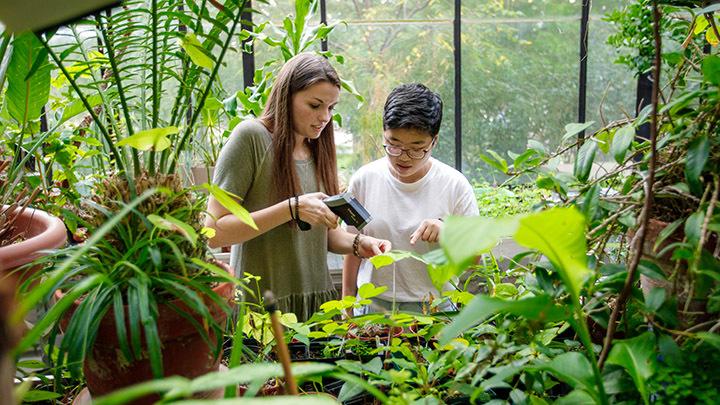Calvin University featured in The Princeton Review Guide to Green Colleges 2021 Edition

The Princeton Review says Calvin University is one of the nation’s most environmentally responsible institutions. The education services company is the latest to highlight Calvin’s sustainability efforts, featuring the university in The Princeton Review Guide to Green Colleges: 2021 Edition.
Released this month, the guide recognizes 416 colleges and universities for their commitment to the environment and sustainability. The Princeton Review chose the colleges based on its survey of administrators at 695 colleges in 2019–20 concerning their institutions' sustainability-related policies, practices, and programs. Survey topics ranged from academic offerings and campus initiatives to career preparation for "green" jobs.
"We strongly recommend Calvin University to students who want to study and live at a green college," said Rob Franek, The Princeton Review's Editor-in-Chief. "Each and every one of the outstanding colleges in this edition of our guide offers both excellent academics and exemplary evidence of environmental commitment.”
The school profiles in The Princeton Review Guide to Green Colleges include "Green Facts" sections detailing such matters as the availability of transportation alternatives on campus and the percentage of the college food budget spent on local/organic food.
“We are grateful for this recognition from The Princeton Review,” said Becky Haney, chair and associate professor of economics at Calvin University. “Sustainability and climate change are not issues that can be solved by one particular approach, it is a team effort that cuts across the disciplines.”
The keys to success
It’s this holistic approach that Haney, who has been coordinating Calvin’s sustainability activities for the past five years, says has led to the university’s sustainability success. She also says the definition the university uses when it talks about sustainability is key. Calvin's definition is that sustainability emerges from choices that balance the promotion of economic vitality, social equity, and a flourishing natural environment both now and for generations to come.
“We recognize sustainability is an issue that cuts across the economy and social issues, as well as the environment.” said Haney. “Indeed, Calvin offers over 100 courses related to sustainability across the arts, humanities, social sciences, and the natural sciences.”
More about sustainability at Calvin can be found on Calvin’s sustainability website.Legacy and strategy
Calvin’s roots for caring for creation run deep and span decades, but strategic work done in recent years has put the institution on track to reach two ambitious sustainability milestones: 1) to earn a gold STARS (Sustainability Tracking Assessment and Rating System) designation by 2025, and 2) to reduce net carbon emissions to zero by 2050.
Haney says the university reporting its sustainability metrics to STARS beginning in 2015 and President Michael Le Roy’s signing of the Presidents’ Climate Leadership Commitment in 2017 are two of the significant steps taken in recent years to help ensure the university stays on track toward its desired future state.
Students leading the way
She also notes that while administrators, faculty, and staff are major supporters of this work, its students who have taken a leading role along the way and who are involved in every corner and aspect of sustainability: from engineering students designing the Calvin Environmental Revolving Fund (CERF), which is student-run and monitored and has saved the university hundreds of thousands of dollars and carbon emissions; to the work of students in the Creation Care-themed residence hall; to sustainability coordinators on every dorm floor who foster friendly and robust energy-saving and carbon footprint-reducing competitions; to students from many disciplines engaging in environmental research; to student interns working with Calvin leaders to generate ideas of how to continue to improve sustainability and track progress.
“They are the true champions,” said Haney. “Students are among the leaders of Calvin’s sustainability efforts, provoking and prodding and being on the front lines of doing sustainability. At Calvin, a lot of the savings that we’ve realized over the last 10 years has been because of the efforts of our students.”
About Calvin University
Founded in 1876, Calvin University is a top-ranked, liberal arts university that equips its nearly 3,300 students from 46 U.S. states, 66 countries, and four Canadian provinces to think deeply, to act justly, and to live wholeheartedly as Christ’s agents of renewal in the world. Calvin offers 100+ majors and programs, including graduate-level offerings in accounting, education, geographic information science, media and strategic communication, speech pathology and audiology. Calvin students engage in intensive internships, community-based service learning, and significant research that results in publishing and presenting alongside world-class faculty. The university’s 400-acre campus is located in the vibrant city of Grand Rapids, Michigan. Discover more at calvin.edu.
About The Princeton Review
The Princeton Review is a leading tutoring, test prep, and college admission services company. Every year, it helps millions of college- and graduate school–bound students achieve their education and career goals through online and in-person courses delivered by a network of more than 4,000 teachers and tutors, online resources, and its more than 150 print and digital books published by Penguin Random House. The company’s Tutor.com brand is one of the largest online tutoring services in the U.S. It comprises a community of thousands of tutors who have delivered more than 19 million one-to-one tutoring sessions. The Princeton Review is headquartered in New York, NY. The Princeton Review is not affiliated with Princeton University. For more information, visit PrincetonReview.com and the company's Media Center. Follow the company on Twitter (@ThePrincetonRev) and Instagram (@theprincetonreview ).






